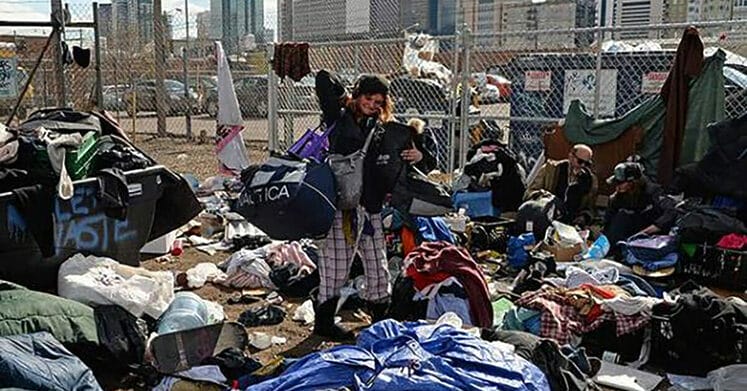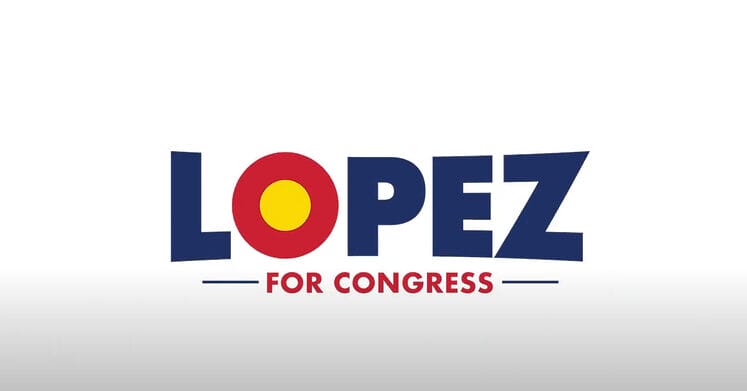I seldom go downtown anymore. Denver, the city that I loved, is no longer the Queen City of the Plains. It’s become dirty and dangerous. It’s disturbing to see sidewalks filled with tents, carts and other paraphernalia. It’s disconcerting to see fellow human beings mired in hopelessness. It’s disappointing to uncover that the Homelessness Industrial Complex is thriving and flourishing.
Follow the money. The Homelessness Industrial Complex is busy researching a variety of tax increases to alleviate the homelessness “crisis” in Denver. A CBS Local report by Brian Maas states that the Colorado Coalition for the Homeless is hiring a pollster to begin the process of getting a tax increase on the ballot in November. Where does a non-profit 501(c)3 organization, that is supposed to be in the business of helping people, have extra money to research a tax increase on you and me? Where does the “non-profit” Colorado Coalition for the Homeless find money to pay for a lobbyist to advocate on their behalf at the State Capitol.
Brian Maas’ notes that according to a 2019 report, estimates are the city of Denver spends about $50,000,000 on the homeless and other charities. Non-profits contribute another $90,000,000. This works out to about $26,000 spent for each of the 5300 homeless persons in Denver. If the proposed $50,000,000 to $55,000,000 tax increase is approved, that number is bumped up over $35,000 for each homeless person. Whew!
Cathy Alderman, Vice-President of Communications and Public Policy for the Colorado Coalition for the Homeless, said, “We really want to explore as many options as possible so voters can tell us what’s most palatable to them.” Alderman said the agency plans to have a polling firm in place in February to begin surveying voters about a potential tax increase. “I don’t think anyone could go outside and walk around and think we are spending enough in that area,” she said. Question? Where does a 501(c)3 non-profit come up with the money to pay a vice-president of Communications and Public Policy?
Maas’ report states that voters will be asked how they feel about each of the following:
- A potential sales tax increase of ¼ to 1%.
- At least doubling Denver’s Occupational Privilege Tax also known as the head tax. Currently employers pay $4.00 per month for each employee and the workers themselves are liable for a fee of $5.75 per month.
- Increasing Denver property taxes.
- Reallocating or increasing marijuana taxes to support the homeless.
These potential tax increases hurt everyday hardworking people; the blue-collar and tech tee-shirt middle class. Let’s break this down:
- Sales taxes are regressive taxes. On a percentage of income, sales taxes take a bigger chunk from a young person trying to make ends meet versus the elite PBI (Politician, Bureaucrat or Interested Parties) who are making six-figure salaries. Clothing, bikes, household supplies and that occasional night out with friends enjoying a craft brew will cost more.
- Head taxes make it more expensive for employers to hire employees. When paired with Denver’s new forced minimum wage and Colorado’s potential forced paid family leave legislation, we will see employers automate instead of hiring human beings. Businesses will close or move. If the head tax doubles, a couple will pay over $20.00 per month for the “privilege” of working in Denver.
- Property tax increases make housing more expensive. This potential tax increase partners the Homelessness Industrial Complex with the Unaffordable Housing Industrial Complex.
- Reallocating or increasing marijuana taxes is a broken promise to the voters. We were told that these taxes would go to education.
Who wins if these new taxes are implemented? Look no further than The Colorado Coalition for the Homeless’ 2018 990 Report filed with the IRS:
- In 2018, the Coalition reported total revenue of $78,330,611 and expenses of $64,957,214 for a net revenue of $13,373.397. That’s a 17% profit margin. Not bad compared with the 5% average profit margin for Colorado’s restaurant industry.
- $32,615,666 of revenue was generated from government grants and $14,233,536 from Medicaid for a total of $46,849,202 revenue directly coming from the taxpayer. How is it okay to use taxpayer money to put forth tax increase questions and pay for lobbyists? Just asking?
- $35,863,946 of expenses was paid to salaries, wages and benefits for employees. $1,351,095 went to compensation of officers, directors, trustees and key employees for a total of $37,215,041.
- President and CEO, John Parvensky, was paid $252,476.
With this kind of money in play, we will never see a solution to the homelessness “crisis” in Denver. The Colorado Coalition for the Homeless should be working to eliminate homelessness with real remedies that encourage healing, resiliency, and dignity. However, if we eliminate the hopelessness of homelessness, we will also eliminate the bureaucracies and non-profits that live off the misery of others. It is time to say no to the Homelessness Industrial Complex’s request for more of our money and demand real solutions to help our fellow human beings.
Feature image credits: I’m From Denver website: (https://imfromdenver.com/the-right-to-survive-law-in-denver/)









Responses
Good, solid reporting, Kim, based on the Colorado Coalition for the Homeless’s own required financial disclosures. These sycophantic “non-profits,” and the bottom feeders that run them, ought to be ashamed of themselves. $47 Million in revenue from taxpayers; $37 Million for wages, salaries, benefits to employees, and “compensation” to higher ups. It’s disgusting.
William, Thank you for your comments. It is quite astonishing when you “follow the money.”
Excellent article, more focus on the this issue and the true facts. Thanks Kim
Thank you, Peggy!
Tax revenue alone for the homeless would be an endless money pit. How effective can any tax revenue be for homelessness without addressing the root cause of the problem? Eighty percent of the homeless are either mentally ill or drug addicts. Historically, vagrancy laws made it a crime for a person to wander from place to place without visible means of support. Basically, these laws criminalized being homeless and jobless. Also, at one time the mentally ill were put in mental institutions. Both vagrancy and isolating the mentally ill in institutions has effectively been eliminated by the courts.
The Substance Abuse and Mental Health Services Administration (SAMSHA) reports that approximately 26 percent of homeless Americans had some form of mental illness, and nearly 35 percent were affected by substance abuse. https://sunrisehouse.com/addiction-demographics/homeless-population/
In January 2015, the most extensive survey ever undertaken found 564,708 people were homeless on a given night in the United States. Depending on the age group in question, and how homelessness is defined, the consensus estimates as of 2014 was that, at minimum, 25 percent of the American homeless—140,000 individuals—were seriously mentally ill at any given point in time. Forty-five percent of the homeless—250,000 individuals—had any mental illness. More would be labeled homeless if these were annual counts rather than point-in-time counts. https://mentalillnesspolicy.org/consequences/homeless-mentally-ill.html
The facts are that we haven’t seen a solution and the following outlines the homelessness challenge created by the courts that will definitely not be solved by a homelessness tax. In a Supreme Court 1999 states are limited on institutionalization. Justice Ruth Bader Ginsburg’s majority opinion held that states’ obligation to care for people in small, neighborhood-based settings was limited to some degree by available resources. States are not required to close their big hospitals — which, the Court emphasized, may still be appropriate for some people — or to create group home programs that they do not now have. (In fact, though, every state now has such a program.)
Justice Ginsburg said that if a state ”were to demonstrate that it had a comprehensive, effectively working plan for placing qualified persons with mental disabilities in less restrictive settings, and a waiting list that moved at a reasonable pace not controlled by the state’s endeavors to keep its institutions fully populated, the reasonable-modifications standard would be met.”
Mental illness is considered a disability protected by Title II of the disabilities act, which prohibits state and local governments from discriminating against people or excluding them from programs ”by reason of” their disabilities. A regulation issued by the Attorney General at Congress’s direction, after the law’s adoption, provides that ”a public entity shall administer services, programs and activities in the most integrated setting appropriate to the needs of qualified individuals with disabilities,” with ”integrated setting” defined as ”a setting that enables individuals with disabilities to interact with nondisabled persons to the fullest extent possible.” https://www.nytimes.com/1999/06/23/us/states-limited-on-institutionalization.html
Hunger cures homelessness.
And the dignity of work. Thanks, Scott!
HL Mencken wrote about the “world savers” who take OUR money in order to gild their standing and consciences. I have spent some time among the homeless to get a sense as to what the scope of the problem is. I’ve found three subsets of homelessness:
1) someone has had some bad luck and needs a break- a job, some healthcare, an opportunity. Their issue is lack of skills or network. Can remediate this issue.
2) bums- if they can sleep for free at a shelter and get free food, $20 a day gets them their bottle or heroin….sad/regrettable- tough love needed
3) mentally ill- like feral cats. YOu could give them keys to the best hotels in Denver at 10 below and they’d still stay clear. VERY tough issue to resolve.
Any other thoughts/comments, clarifications…[email protected] Great post Kim.